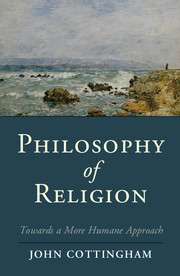3 - Meaning and Modes of Access
Published online by Cambridge University Press: 05 September 2014
Summary
Was ist Gott? unbekannt, dennoch… (‘What is God? Unknown, and yet…’)
HölderlinSpeaking of God
In our discussion of the various issues in the philosophy of religion that have been addressed in the two previous chapters, a certain picture of the subject should gradually have begun to take shape – a picture that diverges in important respects from the way the subject has often been tackled by philosophers and theologians. The emerging picture rejects the construal of the subject that assimilates it to the kind of inquiry appropriate to the sciences – the evaluation of evidence from a distanced and neutral standpoint. It mistrusts the way of understanding religious claims that interprets them as explanatory hypotheses about the nature or workings of the cosmos rather than as hermeneutic frameworks for understanding the human moral and spiritual predicament. It casts doubt on ways of philosophizing about religion that confine themselves exclusively to the resources of the analytic intellect, and shy away from literary, poetic, and imaginative forms of discourse as if these are always liable to contaminate our reasoning and distort our apprehension of the truth. It acknowledges that religion is a phenomenon that arises from deep longings of the human heart, often against the background of dire need and distress; and while not supposing that such conditions in themselves validate or support the resulting beliefs, it nevertheless attempts to pay attention to the context within which religion operates rather than always trying to abstract isolated propositions for detached scrutiny and analysis.
- Type
- Chapter
- Information
- Philosophy of ReligionTowards a More Humane Approach, pp. 48 - 71Publisher: Cambridge University PressPrint publication year: 2014

